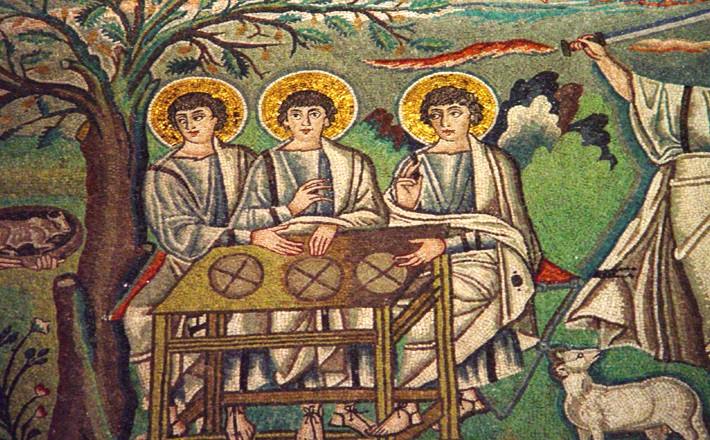Commentary on Psalm 100
Psalm 100 tells us to shout it out.
Many of us were brought up being told to do just the opposite: “Keep your voices down.” “Keep it under control.” “Don’t raise a ruckus.” Maybe you’ve told your kids—or the kids in your Sunday School class—the same thing.
Make a joyful noise
But when it comes to worshiping Yahweh, Psalm 100 claims that it’s very appropriate to turn up the volume. These five verses roar with praise, employing a series of imperative verbs: shout (verse 1), worship (verse 2), enter (verses 2, 4), praise (verse 4), bless (verse 4). Taken together, these commands compel the community to participate in a high liturgical activity, namely, singing in a grand procession into God’s temple.
Throughout Christian history, this psalm has been employed to summon the community together in robust praise. A famous example is Ralph Vaughan Williams’s arrangement of “The Old One Hundredth Psalm Tune,” the processional hymn for the coronation service of Queen Elizabeth II at Westminster Abbey in 1953. It’s a big, bold, and stunningly beautiful piece of music well worth a listen.1
When the choir processes singing “All creatures that on earth do dwell,” one gets a sense of the type of ritual that Psalm 100 depicts. A cathedral full of voices along with organ, brass, and percussion have a palpable effect. As the procession moves forward, our emotions are carried along as well. The psalm and Vaughn Williams’s arrangement of it witness the power of sound and movement working together to glorify God.
Know that the Lord is God
Amidst the summons to the procession, the psalm presents another imperative verbal phrase, “know that the Lord is God” (NRSV, verse 3). At first gloss, this command “to know” seems out of place. We typically understand “knowing” to be an internalized mental process rather than a specific action to which one can be summoned. Yet the Hebrew word “to know” (yd‘) actually suggests something more. This term is used in several contexts (Genesis 4:1 and 1 Kings 1:4) to describe an embodied mutual awareness that comes through sexual intercourse. To be clear, a sexual knowledge is probably not in view in this context. However, the larger usage of the verb “to know” in the Hebrew Bible suggests that the people’s knowledge of Yahweh’s identity is not merely intellectual assent. It is a deep and intimate awareness of God’s identity as revealed to a particular people. The community embodies this understanding of God through the ritual of the procession, through shouting, praising, and entering God’s holy places together.
The sheep of God’s pasture
This worship of God shapes the community’s identity. After the first volley of imperative verbs (verses 1-3a), the psalm pauses for reflection on the nature of the people who are praising God. Because God has formed them, they belong to God. No one outside the community can claim such authority. And no one within the community can claim that authority, since the community didn’t create itself (verse 3b).
The psalm describes God’s people as “the sheep of God’s pasture” (verse 3c). This particular metaphor draws upon royal ideology from the ancient Near East, wherein the king is depicted as shepherd. Those in his kingdom are his sheep. From Egypt to Mesopotamia, kings constantly styled themselves as shepherds.
Yet in this psalm, God appears as the divine monarch, the one who created the people and the one to whom the people owe their identity. When considering the way that the psalm reappropriates royal imagery for Yahweh, we realize the deep irony of the use of Psalm 100 in a coronation service. Psalm 100 orients the community toward the authority of God alone.
The pastoral imagery (verse 3) gives way to a description of the constructed space of the city (verse 4) along with a renewed summons to continue the procession: “enter his gates with thanksgiving and his courts with praise” (verse 4). The ritual of praise moves through all places, from the fields to the metropolis with its complex architecture. All of these places are appropriate to worship Yahweh, for God is king everywhere.
Yahweh is good
The psalm ends with a simple justification for the repeated call to praise: Yahweh is good (verse 5).
The word tov, translated “good” here, has a wide semantic range in the Hebrew Bible. So we must explore the immediate context to clarify the sense of this word in this psalm. Yahweh’s goodness is seen through the longstanding relationship that Yahweh has with the people. The characteristics of God’s “steadfast love” (chesed) and “faithfulness” (’emunah, verse 5) appear frequently in tandem in the Psalms to describe God’s enduring commitment to God’s people (36:5; 40:10; 88:11; 89:1-2, 24, 33, 49; 92:2; 98:3). What makes Yahweh good is that Yahweh has been reliable for a long time. Thus we can continue to rely on Yahweh into the future.
In a time where Christian communities are increasingly fractured and contentious, it is difficult to imagine a throng of faithful witnesses moving together as one in praise to God. It is precisely at this difficult time, however, when Old One Hundredth should come to our lips.
Whenever we sing this psalm, we join a vast community of praise throughout the course of history. As we bear witness to God’s goodness, we step into a procession that stretches across time and place. We celebrate God’s enduring commitment to the redemption of the world and reaffirm our common identity as God’s people. Our loud shouts of praise announce the coming of God’s kingdom.


June 18, 2017